"Human factors is about understanding how people interact with systems, environments and each other."
Director's Log
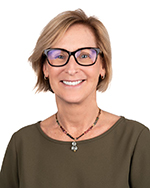
At OCIMF, our mission has always focused on improving safety and environmental performance across the maritime industry. Integrating human factors has reshaped how we pursue that mission, not as an add-on, but as a lens that guides our thinking.
Human factors is about understanding how people interact with systems, environments and each other. By embedding this perspective into our programmes and publications, we encourage ourselves, our members and stakeholders to move beyond a compliance mindset and look more closely at how work is actually done. It leads us to ask not only what happened, but why, and how processes, equipment and organisational culture can better support people to work safely and effectively.
This approach promotes openness, collaboration and continuous improvement. When we consider real working conditions, we create guidance that is practical, realistic and resilient. It helps us learn from normal work as well as incidents, and to build systems that anticipate human variability rather than react to it.
As already showcased during our recent OCIMF Day, you can expect human factors as a red thread through our work going forward. By championing human factors, OCIMF is helping the industry adopt a more human-centred lens, one that sees people not as a problem to control, but as a strength to support.

Karen Davis
Director OCIMF
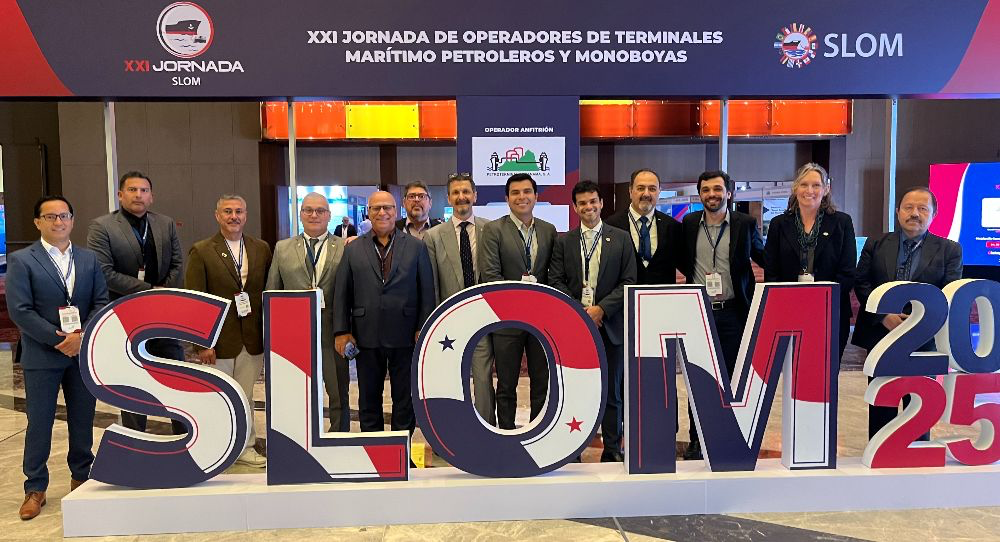
From left: Jorge Luis Espinoza and Alan Claudet (Pluspetrol), Jose Carrizo (Ecopetrol), André Luís Nunes Mello, Mauro Pinheiro Conde and Wellington Brasil (Petrobra/Transpetro), Darron L. Biddle (OCIMF), Cesar Eduardo Sanchez San Roman (Pluspetrol), Raphael Reguine and Filipe Santana (Petrobra/Transpetro), Walter O. Garibotto (YPF), Alexys Nielsen (OCIMF), Eduardo Gallegos (Pemex).
SLOM Jornada embraces challenges and opportunities
OCIMF Engineering Adviser Alexys Nielsen and P&A Director Darron L. Biddle attended the 21st conference of the Society of Maritime Oil Terminal and Monobuoy Operators (SLOM Jornada XXI) in Panamá, 24-26 September.
They had the opportunity to interact with many OCIMF member representatives from Central and South America and hear a wide range of high-quality technical presentations focused on safely managing the challenges of offshore loading and unloading. At the conclusion of the event, former OCIMF Engineering Adviser, Filipe Santana, was installed as the new SLOM President.
The following themes were noted across all conference presenters:
- A focus on the people at the heart of these operations, the human element.
- A commitment to observing and implementing the best practice recommendations found in OCIMF publications.
- A desire to embrace the challenges as well as the opportunities presented by the emerging technologies that will enable the industry to meet the goals of the IMO Net Zero Framework.
For more information, contact Darron L. Biddle, OCIMF P&A Director,
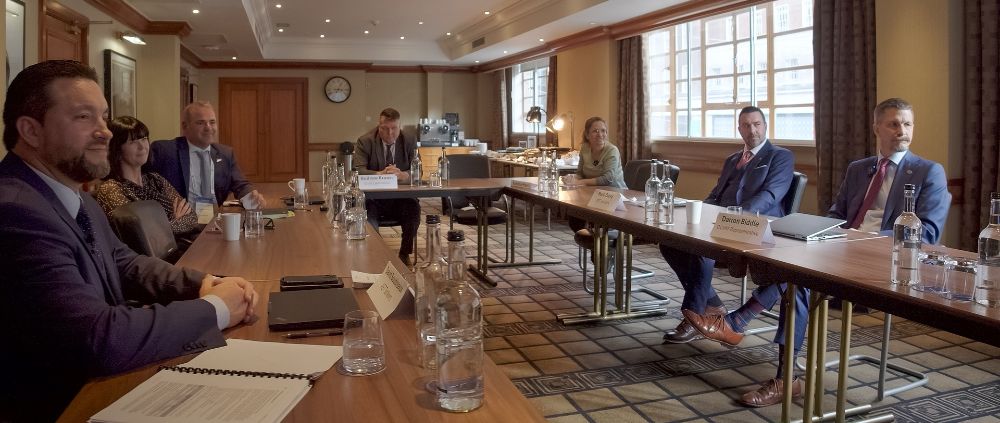
Ship to Ship Transfer Guide roundtable
On 21 October, Darron L. Biddle, Publications and Advocacy Director, participated in a roundtable discussion of the Ship to Ship Transfer Guide for Petroleum, Chemicals and Liquefied Gases second edition.
Darron joined representatives from STS service providers, FLNG pilotage tug provider, P&I club and STS consultancy in a roundtable discussion of the publication’s expanded emphasis on human and organisational factors, competency management, personnel transfers and equipment assurance. The event was hosted by Riviera Maritime Media, on the sidelines of the LNG Shipping and Terminals Conference in London.
For any queries, contact Darron L. Biddle, OCIMF P&A Director,
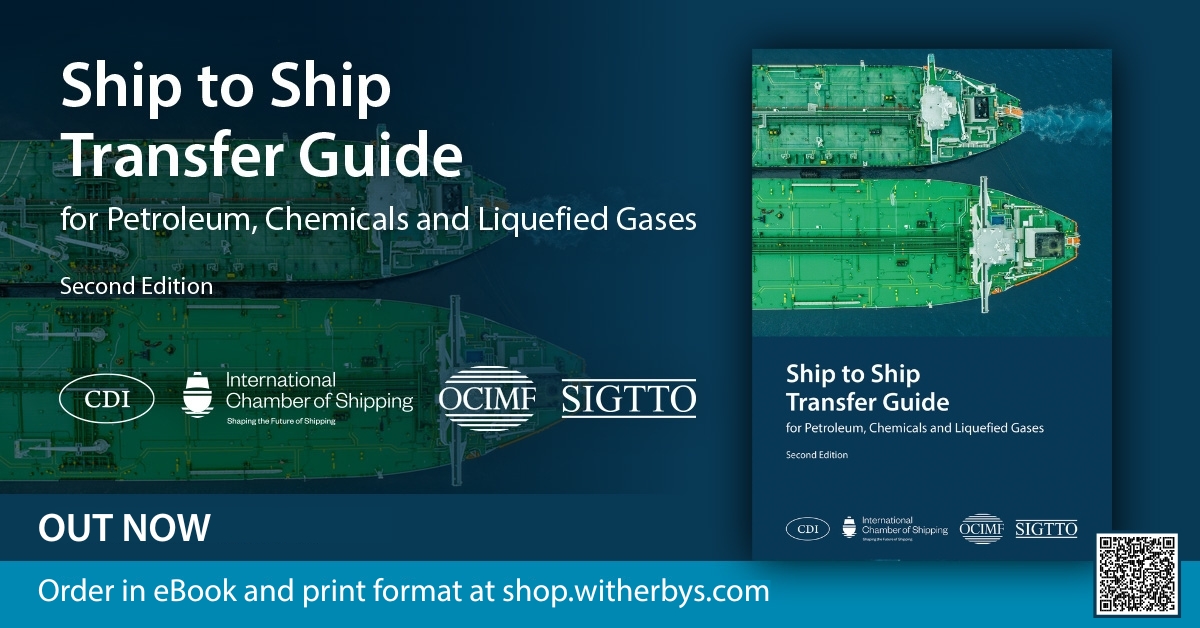
Maritime security news
On 14 October, the International Maritime Bureau released its latest report covering the period Jan-Sep 25, highlighting that the first nine months of 2025 recorded the highest number of incidents in the Singapore Straits since 1991.
Overall, 116 incidents were reported, up from 79 in the same period last year. 102 vessels were boarded, nine faced attempted boardings, four were hijacked and one was fired upon. In 91% of incidents, perpetrators successfully gained access to the vessel with most boarding incidents occurring during the hours of darkness. The threat of violence against crew remains a concern, with weapons identified in 55% of reported cases. Guns were visibly carried in 33% of cases. Against these incidents, 43 crew members were taken hostage, 16 kidnapped, seven threatened, three assaulted and three injured.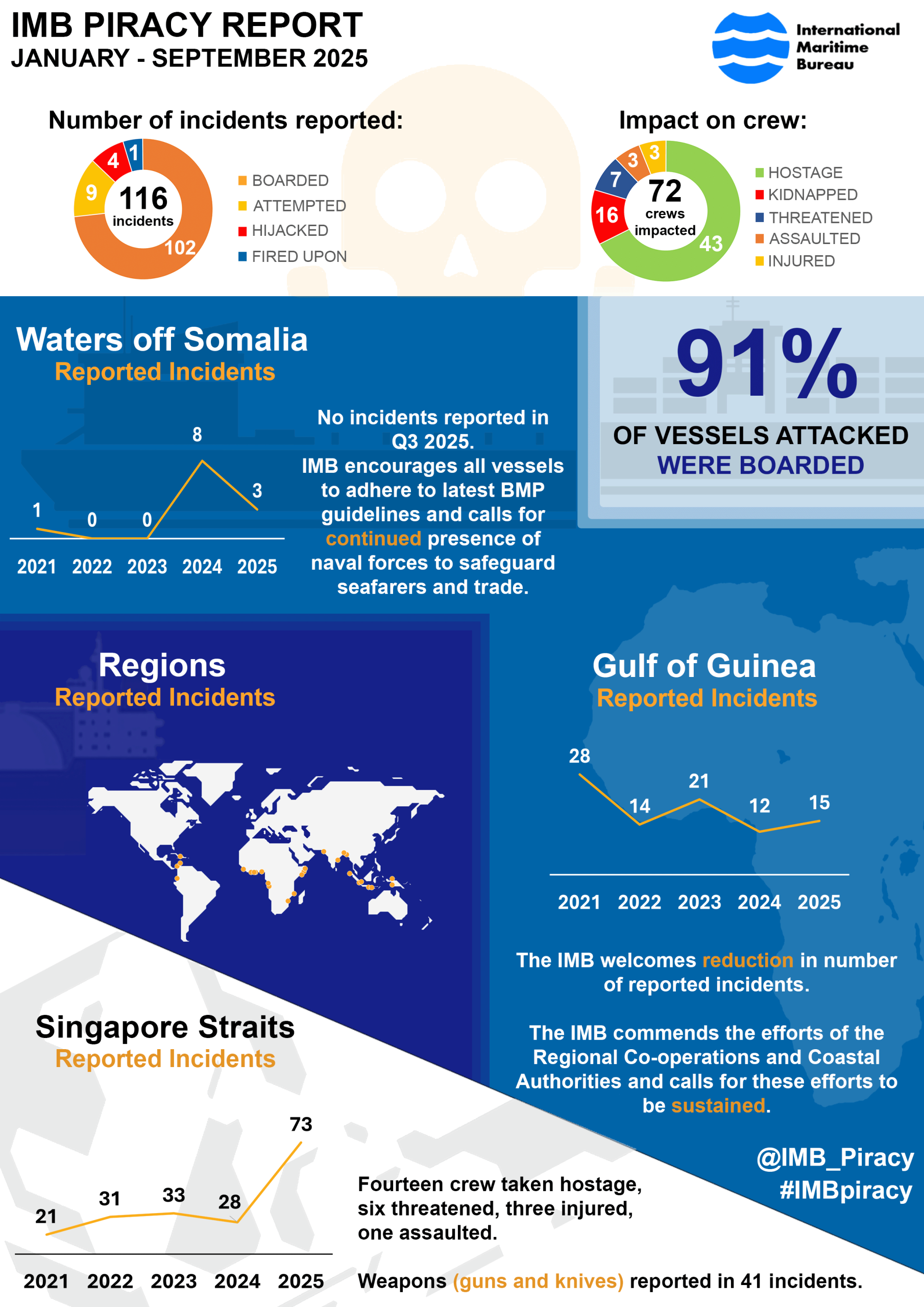
IMB Director, Michael Howlett, said “We urge the continued use of collaborative frameworks and commend the efforts undertaken by regional authorities that has contained incident levels and enhanced security of crews and vessels globally.”
Members are encouraged to look at the guidance and reporting procedures in the latest version of the Best Management Practices – Maritime Security.
For more information, contact Russell Pegg, OCIMF Security Adviser,
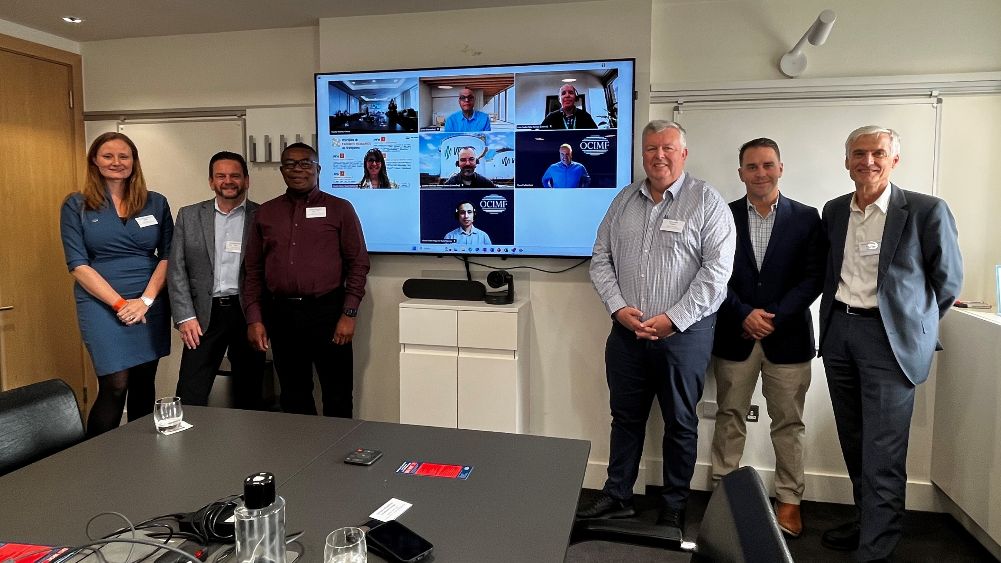
Human Factors Committee
Chair: Terry Luke (Chevron)
Vice Chairs: Patrick McNeil (Shell), Laurent Routisseau (TotalEnergies)
Secretary: Maartje Wibrew-Forster (OCIMF Human Factors Adviser)
10th meeting: 15–16 September (London)
OCIMF's Human Factors Committee held its 10th meeting in London in September using hybrid functionality. The meeting opened with renewed energy, welcoming various new members to the committee, and a powerful Human Factors Safety Moment led by Vice Chair Paddy McNeil (Shell). Paddy demonstrated how the use of a Performance Influencing Factors (PIF) Analysis Tool can help uncover how behaviours are shaped by the systems people work in.
Significant progress was made on the OCIMF Human Factors Guide, which is now nearing completion. The committee confirmed alignment with the IOGP approach to human performance, while recognising the broader OCIMF audience, including frontline personnel. The guide builds on the 2020 information paper, The OCIMF Human Factors Approach, offering further detail on human factors principles and how to integrate them into an organisation. Publication is targeted for Q1–Q2 2026.
A highlight of day two was the multi-year plan workshop facilitated by Steve Alder. Across four sessions, the Committee mapped short-, medium- and long-term priorities, developed a 2035 vision where human factors is fully embedded across OCIMF, and identified the ‘building blocks’ needed to support delivery. The discussion marked a strategic shift from isolated initiatives to long-term integration, learning and prioritisation.
For more information, contact Maartje Wibrew-Forster, OCIMF Human Factors Adviser,
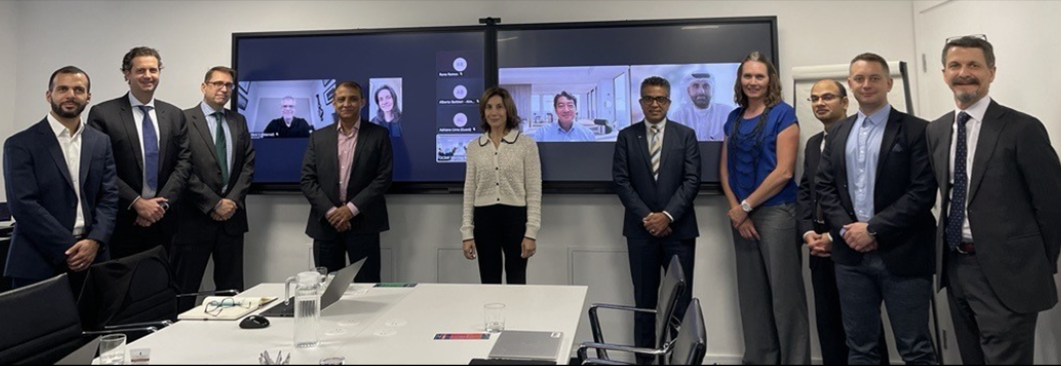
Environment Committee
Chair: Maria Polakis (BP)
Vice Chairs: Saif Saleh Alhammadi (ENOC), Samar Pradhan (Shell)
Secretary: Martin Young (OCIMF Environmental Adviser)
11th meeting: 7–8 October 2025 (London)
The Environment Committee held its 11th meeting at OCIMF’s London offices. The Committee is refining its approach in evaluating environmental issues within the presently dynamic regulatory framework. Members centred on revising the Committee’s work programme while also reaffirming the existing P1 priorities of GHG reductions and air pollution. The agenda covered the then forthcoming IMO MEPC Extraordinary Session (MEPC-ES2), a comparison of SIRE/CDI environmental questions and closed with an interesting presentation from OceanWings on wind-assisted propulsion. The group will discuss the outcomes of the recent MEPC-ES2 at its next intersessional meeting.
For more information, contact Martin Young, OCIMF Environmental Adviser,
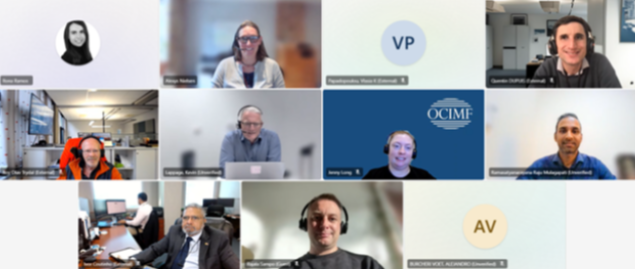
Engineering Expert Group
Lead: Dave Deltano (Marathon)
Co-lead: Kevin Lappage (BP)
Secretary: Lexy Nielsen (OCIMF Engineering Adviser)
15th meeting: 9 October 2025 (virtual)
The 15th meeting of the Engineering Expert Group (EEG) met virtually and discussed recent revisions to the 3-year workplan and the review of the information paper Recommendation on Engineering Watch/Duty Period Handover and Inspection Routines. Updates were provided on the revision progress of the information paper Safety Critical Equipment and Spare Parts Guidance, with drafting expected to complete Q1 of 2026.
The meeting focus was an in-depth review of industry incidents caused by flammable liquids contacting hot surfaces. Discussion concentrated on incident mitigation measures including design recommendations and enhanced survey options to ensure effective insulation of hot surfaces, particularly as vessels age and pre/post repair periods.
A warm welcome to our newest EEG members from Vast, QatarEnergies and TotalEnergies.
For enquiries, contact Lexy Nielsen, OCIMF Engineering Adviser,
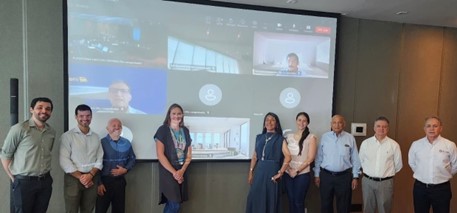 Multi Buoy Mooring Guidance Revision Working Group
Multi Buoy Mooring Guidance Revision Working Group
Lead: Jeff Bayham (ExxonMobil)
Co-lead: Raphael Reguine Ribeiro (Transpetro)
Secretary: Lexy Nielsen (OCIMF Engineering Adviser)
First face-to-face meeting: 22-23 September (Panama City)
Members of the working group revising the Guidelines for the Design, Operation and Maintenance of Multi Buoy Moorings met for their first in-person session on 22 and 23 September in Panama City. The group extends a warm thank you to the Sociedad Latinoamericana de Operadores de Terminales Maritimo Petroleros y Monoboyas (SLOM), who generously hosted the event and invited members to participate in the Jornada event later that week.
During the two-day meeting the group discussed the overall scope and boundaries for the document, finalised the MBM risk assessment bowtie, created a revised table of contents for the new publication and identified sub-working groups for drafting the new content.
The working group meetings will continue virtually with a drafting completion target at the end of 2026.
For enquiries, contact Lexy Nielsen, OCIMF Engineering Adviser,
IMO news
2nd Extraordinary Session of the IMO Marine Environment Protection Committee (MEPC ES.2)
MEPC ES.2 was held at the IMO headquarters from 14–17 October 2025 to consider the adoption of proposed amendments to MARPOL Annex VI. This included a new Chapter 5 on the IMO Net-Zero Framework as approved by the MEPC during its 83rd session in April this year.
Following discussion, the Committee agreed to adjourn the meeting and reconvene the extraordinary session in a year’s time to continue consideration towards adopting the IMO Net-Zero Framework.
20th meeting of the Intersessional Working Group on Reduction of GHG Emissions from Ships (ISWG-GHG 20)
ISWG-GHG 20* was held from 20–24 October following the MEPC ES.2 where discussions included the following items:
-
The group noted that the MEPC ES.2-approved workplan to prepare the entry into force of the IMO Net-Zero Framework, including the timelines for 14 GHG-related workstreams, would be subject to the adoption of the Framework.
-
Fuel Life Cycle Assessment (LCA) – need for robust scientific methodology to select default GHG emissions factors of fuels and to conduct regular review of emissions factor in line with efficiency and technological developments in fuel pathways.
-
Need for guidance related to zero or near-zero GHG emission fuels and technologies (ZNZs) as well as key elements and indicators for determining reward.
-
General interest for holding a GHG expert workshop related to development of governing provisions for the IMO Net-Zero Fund.
-
General discussion on guidelines for GHG Fuel Intensity (GFI) compliance, calculation, reporting and verification and submission of annual GFI data.
-
Draft terms of reference for the Fifth IMO GHG Study.
Further proposals on the above themes are expected to be submitted ISWG-GHG 21 and further considered at MEPC 84 next year.
*It should be noted that the ISWG-GHG is a technical working group reporting to the MEPC, which is the higher decision-making body.
For enquiries regarding IMO matters, contact OCIMF Risk and Regulatory Affairs Adviser, Abhijit Aul
